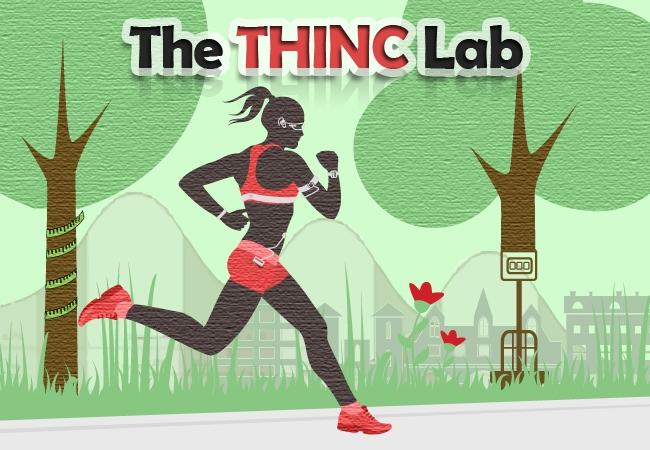
At the THINC lab, we are concerned with placing Technologies of Health IN Context. More specifically, we seek to better understand the wide range of technologies that are commonplace in our health and fitness experiences as we seek to monitor, assess and advance our health.
Department: Kinesiology
Room Number: 0110K
Director: Shannon Jette
Office Phone Number: (301) 405-2497
Email: jette@umd.edu
The technologies that we seek to understand include mobile digital such as fitness trackers (e.g., the Fitbit) and fitness apps (e.g., MyFitnessPal) but also other measuring tools such as skinfold calipers and weigh scales. How are they put to use? How do they shape the ways we understand our bodies and our health? However, we also understand technologies of health as the systems of scientific classification (e.g., BMI, DSM-5), the practices of normalizing judgment (e.g., fit or unfit? able or disabled? healthy or unhealthy?), and the related examinations, techniques and tools used to make these assessments that are integral to the disciplines of kinesiology, medicine and public health. We seek to place these technologies of health in context to better understand how they shape the ways that we make sense of bodies and health (both physical and mental). We are particularly interested in exploring what bodies they exclude, marginalize or stigmatize.
We view exercise and fitness not simply as an apolitical and 'natural' bodily act, but as a technology of health that is underpinned by a vast system of scientific knowledge - and its associated norms and classification systems - that informs how we view, understand and experience the (in)active body. In this way, exercise and fitness practices become a technique for individuals to shape their bodies and identities. Our purpose is to explore these varying systems of bodily knowledge, the exercise practices (and bodies) they privilege, and the type of subjects they seek to produce. At the same time, however, we are interested in how individuals (and groups of individuals who vary by social location) negotiate the at times competing discourses about the (in)active body and health, as well as their embodied experiences of physical activity. Much of the work in the THINC lab focuses on how knowledge about physical activity is constructed, disseminated and taken up in the context of the 'obesity epidemic.' The three main foci of the THINC lab are currently: prenatal exercise as a technology of reproductive health; digital technologies in physical education; and alternative ways of knowing about PA, health and the body.
The (In)Active Pregnant Body in the Context of the 'Obesity Epidemic'
In this on-going and multi-dimensional project, I am interested in the issue of gestational weight gain in the context of the 'obesity epidemic.' A key focus of my work has been concerned with the politics of prenatal exercise prescriptions whereby I demonstrate how health practitioners’ prenatal exercise advice has never been neutral nor objective; rather it has shifted in relation to the social and political context in which it has been produced. My examinations span from doctor's advice to upper and middle class women in the late 19th century to the explosion of prenatal exercise interventions in the context of the 'obesity epidemic,' and draw on a range of qualitative research methods from document and policy analyses to in-depth interviews.
Relevant publications include:
Jette, S. (2023). Materializing risk in the pregnant athlete: Using material-semiotic tools to examine black-boxed and dis-qualified ‘facts’ in the IOC evidence summaries. In L. Spowart & K. McGannon (Eds.), Motherhood and sport: Collective stories of identity and difference (pp. 76-88). New York, NY: Routledge.
Jette, S., & Esmonde, K. (2020). The (in)active body multiple: An examination of how prenatal exercise ‘matters’. In M. MacDonald & J. Sterling (Eds.), Sports, society and technology anthology (pp. 195-217). Palgrave Macmillan.
Jette, S., Esmonde, K., & Maier, J. (2019). Exploring prenatal physical activity at the ‘postgenomic turn’: A transdisciplinary journey. Leisure Sciences, 41(1-2), 36-53.
Jette, S. (2018). Sport for all, or fit for two? Governing the (in)active pregnancy. In R. Dionigi and M. Gard (Eds.), Critical perspectives on sport and physical activity across the lifespan. Palgrave Macmillan, UK.
Jette, S., Maier, J., Esmonde, K., & Davis, C. (2017). Promoting prenatal exercise from a sociocultural and life-course perspective: An “embodied” conceptual framework. Research Quarterly for Exercise and Sport, 88(3), 269-281.
Jette, S. (2017). Pregnant bodies. In D. Andrews, M. Silk, & H. Thorpe (Eds.), Routledge handbook of Physical Cultural Studies (pp. 313-320). New York: Routledge.
Jette, S., Vertinsky, P., & Ng, C. (2014). Biomedicine and balance: Chinese-Canadian women’s negotiate pregnancy-related lifestyle directives and risk. Health, Risk & Society, 16(6), 494-511.
Jette, S., & Rail, G. (2014). Resisting, reproducing, resigned? Low income pregnant women’s constructions and experiences of a healthy pregnancy and proper weight gain. Nursing Inquiry, 21(3), 202-11. DOI: 10.1111/nin.12052
Dumas, A., Robitaille, J., & Jette, S. (2014). Young women, health and poverty: Lifestyle as a choice of necessity. Social Theory and Health, 12, 138-58. DOI:10.1057/sth.2013.25
Jette, S., & Rail, G. (2013). Ills from the womb? A critical examination of Evidence-Based Medicine and pregnancy weight gain advice. Health: An Interdisciplinary Journal for the Social Study of Health, Illness and Medicine, 17(4), 407-21.
Jette, S. (2011). Exercising caution: The production of medical knowledge about physical exertion during pregnancy. Canadian Bulletin of Medical History/ Bulletin canadien d'histoire de la medicine, 28(2), 383-401.
Jette, S. (2006). “Fit for Two?”: A critical discourse analysis of Oxygen fitness magazine. Sociology of Sport Journal, 23(4), 331-351.
Big bodies, big data? The governance of bodies through the ‘New Physical Education’
Over the past decade, within U.S. schools (and universities) we have witnessed the evolution of what has been coined the New Physical Education (PE). The adjective ‘new’ refers to the use of technology (in the form of pedometers, heart rate monitors, and video and music exer-games) to keep youth engaged in physical activity, while at the same time allowing for the measurement, collection, and assessment of body and fitness-related data. The stated objective of this enhanced engagement with technology is to generate knowledge that can be used in programmatic and policy settings to fight obesity within the U.S. The involvement of corporations and non-profit entities in what was previously under the purview of government and trained educators adds further complexity to the topic.
The inclusion of digital surveillance and analytics in the PE setting brings with it pressing questions about student privacy and exploitation, as well as uncertainty around how these digital technologies might influence young people’s concepts of selfhood, health and the body (i.e., their embodied subjectivities). To date, however, there is a noticeable absence of in-depth, empirically-grounded investigations as to how the New PE in the United States is ‘playing out’ on the ground.
The purpose of this project is to examine this emerging and complex intersection of technology and physical education through a range of in-depth case studies.
Relevant publications include:
Esmonde, K., & Jette., S. (2021). ‘We are not a nation of softies, but we could become one’: Exploring the materiality of fitness testing in the President’s Council on Youth Fitness. Somatechnics, 11(3), 395-412.
Jette, S., Esmonde, K., Andrews, D., & Pluim, C. (2020). Big bodies, big data: Unpacking the Fitnessgram® black box. In J. Newman, H. Thorpe, & D. Andrews (Eds.), Sport, physical culture, and the moving body: Materialisms, technologies, ecologies (pp. 131-150). Reutgers University Press.
Jette, S., Bhagat, K., & Andrews, D.L. (2016). Governing the child-citizen: ‘Let's Move!’ as national biopedagogy. Sport, Education and Society, 21(8), 1109-1126. DOI: 10.1080/13573322.2014.993961
Alternative body ontologies (Eastern and Indigenous)
An additional segment of my research focuses on alternative ‘ways of knowing’ about the female body, physical culture and health beyond the biomedical model. Of particular interest have been Eastern medical traditions and Indigenous knowledge, both grounded in holistic understandings of the connection between mind, body and society, albeit in differing ways.
I have collaborated with an urban American Indian (AI) community on a project that was prompted by community members’ concerns about the well-being of the female youth. We used qualitative research techniques to explore how female youth in the community construct and experience health and PA, as well as how/if traditional culture shapes their understandings. In doing so, we addressed a significant gap in substantive knowledge, also building upon research utilizing a decolonizing approach.
I have also engaged in an international collaboration with colleagues in Vancouver, Canada in which we compared and contrasted how pregnancy-related risk is derived and envisioned in Traditional Chinese Medicine and Western biomedicine, and used qualitative research methodology to explore how pregnant Chinese Canadian women understand and experience pregnancy-related ‘risk’ and lifestyle directives and pedagogies. This was part of a larger project in which we also explored how aging Chinese Canadian women understand and experience health, the body and physical culture. Findings from this research illustrate the complex way that bodily understandings and social location (i.e., race/ethnicity, class, immigrant status) intersect to shape women’s health and physical (in)activity practices, and underscore that, where PA promotion is concerned, one size does not fit all. I continue my focus on Eastern physical culture through an interdisciplinary collaboration that brings together SPH faculty from kinesiology, environmental health and epidemiology to evaluate yoga from a biological and social perspective. I am leading the qualitative portion that is informed by the notion of embodiment with the aim of better understanding the integration of mind and body, and exploring the tensions between Eastern and Western body ontologies. We are currently collecting pilot data, and seeking funding for this integrative health initiative.
Relevant publications include:
Jette, S., & Roberts, E. (2016). “We usually just start dancing our Indian dances”: Urban American Indian (AI) female youths’ negotiation of health and body size. Sociology of Health and Illness, 38(3), 396-410. doi: 10.1111/1467-9566.12349.
Roberts, E., & Jette, S. (2016). Implementing participatory research with an urban American Indian community: Lessons learned. Health Education Journal. 75(2), 158-169. doi: 10.1177/0017896915570395.
Jette, S., & Vertinsky, P. (2015). The contingencies of exercise science in a globalizing world: Ageing Chinese Canadian and their play and pleasure in exercise. In E. Tulle & C. Phoenix (Eds.). Physical activity in sport and later life. London: Palgrave Macmillan.
Jette, S., Vertinsky, P., & Ng, C. (2014). Biomedicine and balance: Chinese-Canadian women’s negotiate pregnancy-related lifestyle directives and risk. Health, Risk & Society, 16(6), 494-511. doi:10.1080/13698575.2014.942603
Jette, S., & Vertinsky, P. (2011). ‘Exercise is medicine’: Understanding the exercise beliefs and practices of older Chinese women immigrants in British Columbia, Canada. Journal of Aging Studies, 25(3), 272-84.
Shannon Jette, Associate Professor, Physical Cultural Studies (Kinesiology)
Dr. Jette received her MA (2004) and PhD (2009) in Kinesiology from the University of British Columbia, and conducted postdoctoral research at the Simone de Beauvoir Institute at Concordia University in Montreal, Quebec before coming to the University of Maryland in August 2011. Her graduate and postdoctoral research were funded by the Canadian Institutes of Health Research and the Social Sciences and Humanities Research Council of Canada.
Dr. Jette uses a range of qualitative research methodologies (including media and discourse analysis, in-depth interviews, focus groups, ethnographic techniques) to examine: the production of knowledge about gender, health and physical activity; how this knowledge has been (and is) put to use in the operation of power in differing socio-historical contexts; and how individuals, especially those from marginalized groups, negotiate various health-related messages. Much of her work focuses upon the relationship between women's health and physical activity/movement in the context of the 'obesity epidemic' and she is also interested in the growing use of fitness and exercise technologies in physical education classes.
THINC Lab Affiliates
David Andrews, Professor, Physical Cultural Studies (Kinesiology)
Professor Andrews' research critically examines physical culture as a complex empirical assemblage (including, but not restricted to, sport, fitness, exercise, recreation, leisure, wellness, dance, and health-related movement practices). Informed by various understandings of cultural Marxism, his approach considers physical culture as both a product and producer of the cultural, social, political, economic, technological, and environmental dimensions of contemporary society. Among other foci, he analyzes the complex interconnections linking physical culture with the structures and strictures of late capitalism, related systems of neoliberal governance, and the nature of life within the contemporary metropolis. The overarching aim of this research is to illuminate the ways that active bodies become organized, disciplined, represented, embodied, and/or experienced in mobilising (or corroborating), or at times immobilising (or resisting), the dominant power relations operating within society that differentiate between the empowered and disempowered, the privileged and underprivileged.
Selected Publications (Andrews):
Silk, M.S., Francombe, J.M. & Andrews, D.L. (2014). Slowing the Social Sciences of Sport: On the Possibilities of Physical Culture. Sport in Society, 17 (10), 1266–1289.
Wiest, A., Andrews, D.L., & Giardina, (2015). Training the Body for Healthism: Reifying Vitality In and Through the Clinical Gaze of the Neoliberal Fitness Club. Review of Education, Pedagogy, and Cultural Studies, 37 (1), 21-40.
DeLuca, J., & Andrews, D.L. (in press). Exercising Privilege: The Reproduction of the Upper-Middle Class through Swim Club Membership. Sociological Inquiry.
Katelyn Esmonde, Postdoctoral Fellow, Johns Hopkins University (Berman Institute of Bioethics)
While completing an M.S. in sociology of sport at Purdue University, Katie participated in research that focused on the gendering of sports fandom and the exclusion of women sports fans, as well as the media framing of sports scandals. Her doctoral research examined how gender, race, sexuality influence inequality in health education, qualitative methodology, and theories of physical culture. She is currently a postdoctoral fellow at the Berman Institute of Bioethics, and is focusing on the ethics of using digital data in workplace wellness programs in order to quantify and track employees' health related activities.
Selected Publications (Esmonde):
Esmonde, K., & Jette, S. (2018). Fatness, fitness, and feminism in the built environment: Bringing together Physical Cultural Studies and Sociomaterialisms, to study the ‘obesogenic environment. Sociology of Sport Journal, 35(1), 39-48.
Esmonde, K., & Jette, S. (2018 available online). Assembling the ‘Fitbit subject’: A Foucauldian-sociomaterialist examination of social class, gender, and self-surveillance on Fitbit community message boards. Health: An Interdisciplinary Journal for the Social Study of Health, Illness and Medicine. https://doi.org/10.1177/1363459318800166
Dr. Jette is a co-founder of NatureRx@UMD, a new and burgeoning movement, represented by numerous individuals and units within the University of Maryland College Park community, who have come together with a shared passion for the many ways in which the landscape of our campus arboretum and other recreation spaces can heal and preserve the health and well-being of every person. To learn more about NatureRX@UMD, visit the website: https://sph.umd.edu/research-impact/laboratories-projects-and-programs/naturerxumd-laboratory

